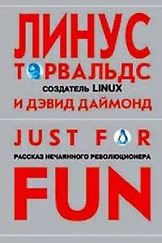"No," he answers. "I just didn't feel the need to share this with my family and friends. I never had the feeling that I wanted to push it on people. I remember Lars Wirzenius, around the time I was writing Linux, decided to buy XENIX, SCO's version of Unix, and I think I remember he tried to make excuses, like, 'Don't take this the wrong way.' I personally don't think I ever cared. He eventually switched, but it wasn't a big deal for me. To me the fact that people used it was nice, and it was wonderful that I got comments back, but at the same time it was not that important. I didn't want to spread the gospel. I was proud of having people use my code, but I don't remember ever having the feeling that I wanted to share that with anybody. And I didn't think it was the most important thing on Earth. I didn't think that I was doing something really important because a hundred people were using my software. It was more like it was fun. And that's how I feel about it today. "
"So you didn't even want to tell your parents and family and friends about it. And you really weren't excited by everything that was happening?" I ask, not masking my disbelief.
He waits a few seconds before responding. "I don't remember if I even had feelings back then."
Linus buys a new car, a BMW Z3, a two-seater convertible that he says defines the word "fun." It is metallic blue, the perfect boy's model-car color. He chose that shade because the vehicle doesn't come in bright yellow, his color of choice. BMW yellow, heexplains, "looks like pee." For years he parked his Pontiac as close as possible to the entrance to 'Transmeta's headquarters in a Santa Clara office park. But the BMW is parked outside his office window, allegedly so it can be in the shade. Now when Linus works on his computer he can admire his new car at the same time.
A little more than a year earlier, we had taken our first trip over the mountain to Santa Cruz in a convertible, a white Mustang I had rented for the occasion. And during that excursion, Linus had made a point of stopping to check out the sports cars parked outside the sauna place and brewery we visited. Now we are heading over the mountain in his own sports car. He smiles as he takes the curves on Route 17.
"You deserve this," I say.
I pull a handful of CDs from the glove compartment.
"Pink Floyd?" I ask. "The Who? Janis Joplin?"
"lt's the music I grew up listening to. I never bought music when I was a kid, but we had this around the apartment. I guess my mother was playing it, although I remember she was big on Elvis Costello."
It is Friday afternoon, a sparkling Friday afternoon of California perfection with delights for each of the senses: cobalt skies for the eyes, intense sunshine for the skin, the fragrance of mountain eucalyptus, the sweet taste of pure air, the lull of Pink Floyd on upgraded speakers. Sure, to passing motorists we must have appeared to be some sort of postadolescent cliche, spraying on sunblock and doing the classic rock vocals, but not many cars passed Linus's new BMW Z3.
We park among shoddier vehicles along the side of Highway 1 a bit north of Santa Cruz, and make our way down to a mostly empty beach. We spread out on towels in the warm sun and wait a few minutes before I pull my tape recorder from my backpack. Again, I ask him to describe Linus in those early days.
He draws a box in the sand to represent his bedroom, then indicates the location of his bed and computer. "I would roll out of bed and immediately check my email," he says, moving his finger accordingly. "Some days I don't think I ever left the apartment. I wasn't checking my email just to see who was sending me email. It was more a matter of seeing if a particular problem had been fixed. It was more like, What new exciting issue do we have today? Or, if we had a problem, who had a solution?"
Linus tells me that his social life at the time was "pathetic." Then he figures that sounds too pathetic, so he amends it: "Let's say it was one notch above pathetic. "
"I didn't become a total complete recluse," he says, "but even though Linux was happening, I was still as antisocial as I had ever been. You noticed that I never contact people by phone. It's always been true. I never call. Most people who are my friends are the kind of people who contact people, and I'm not. You can imagine what that's like for dating, if you never call the woman. So during that time I had a few friends who just came knocking on my window, wanting to come in for a cup of tea. I don't think anybody could really tell the difference at that time -- Oh, he's doing something really big and important and someday he'll change the world. I don't think anybody really thought anything of the sort.
Linus's single regular social event in those days was the weekly Spektrum meeting, where he mingled with other science majors. These social encounters created far more anxiety than anything connected with technology.
"What was I worrying about? Just social life in general. Maybe worry is the wrong word, there was more emotional impact. Just thinking about girls. Linux wasn't that important to me at the time. To some degree, it still isn't. To some degree I can still ignore it.
"In those early years at the university, the social thing was very important. It wasn't as if I worried about my hunchback and people laughing about it. It was more like wanting to have friends and things. One of the reasons I liked Spektrum so much was that it was a framework for being social without having to be social. That was the evening I was social and every other evening I sat in front of the computer. It was much more of an emotional thing than Linux ever was. Linux was never something I got really upset about. I never lost any sleep over Linux.
"The things that I got really upset about, and what still makes me upset, is not the technology per se but the social interactions around it. One of the reasons I got so upset about Andrew Tanenbaum's posting was not so much the technical issues he was raising. If it had been anybody else, I would have just blown it off. The problem was that he was posting it to the mailing list and making me ... I was concerned about my social standing with those people and he was attacking it.
"One of the things that made Linux good and motivational was the feedback I was getting. It meant that Linux mattered and was a sign of my being in a social group. And I was the leader of the social group. There's no question that was important, more important than even telling my Mom and Dad what I was doing. I was more concerned about the people who were using Linux. I had created a social circle and had the respect of those people. That's not how I thought of it at the time, and it's still not how I think of it. But it must be the most important thing. That's why I reacted so strongly to Andrew Tanenbaum.
The sun begins its descent into the Pacific andit's time to leave the beach. Linus insists that I drive his car home -- to see how well it responds -- and that we take the long and winding way, Route 9, back to Silicon Valley.
Linus says the flamefest With the Minix creator eventually moved into private email because it had become too nasty to be public. It was quiet for a few months. Then, Tanenbaum emailed Linus to direct him to the five-line ad in the back of Byte magazine for somebody's commercial version of Linux.
"The last email I got from Andrew was him asking me if this is really what I wanted to do, have somebody selling my work. I just sent him an email back saying Yes, and I haven't heard from him since," he says.
Читать дальше












